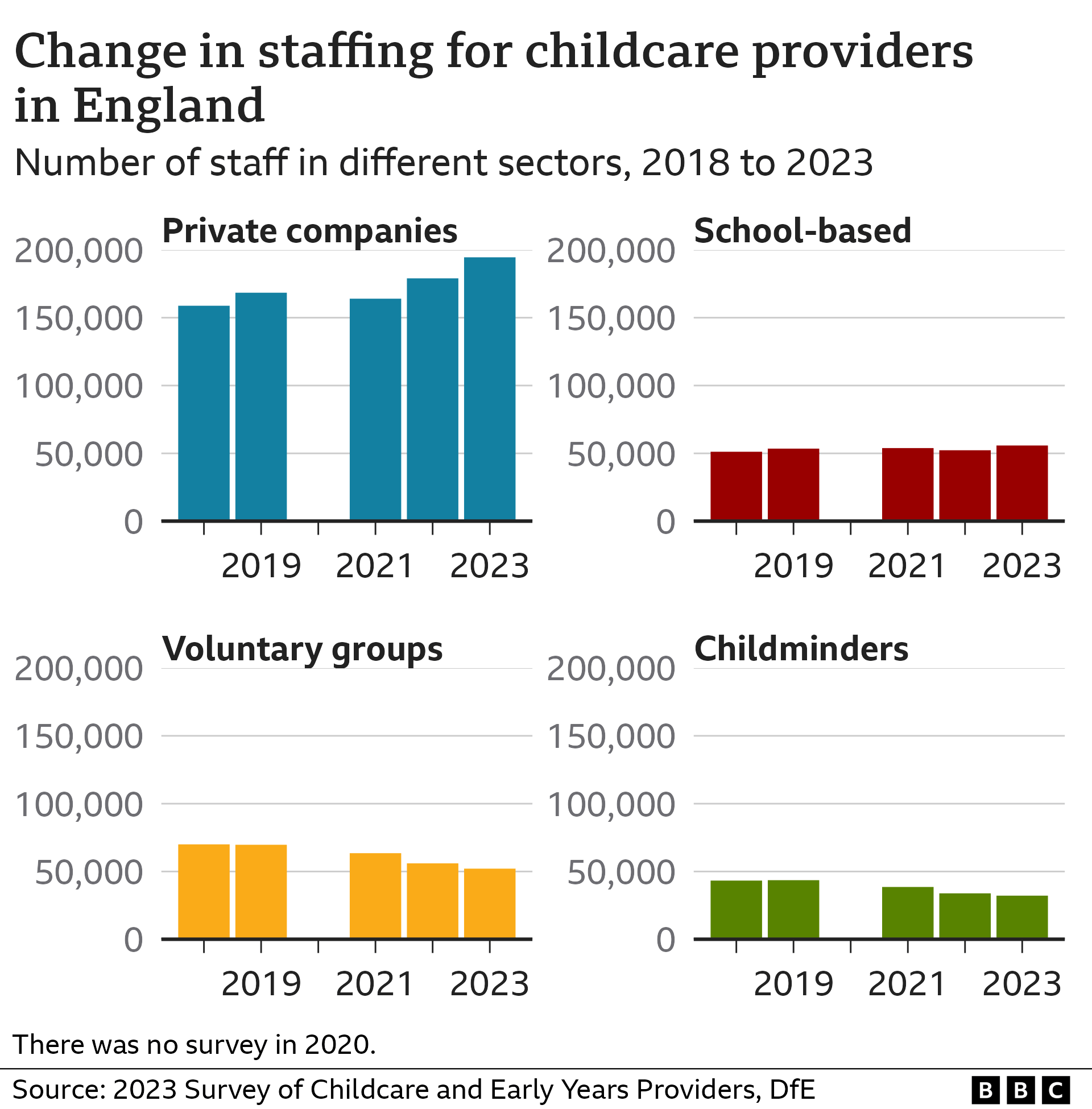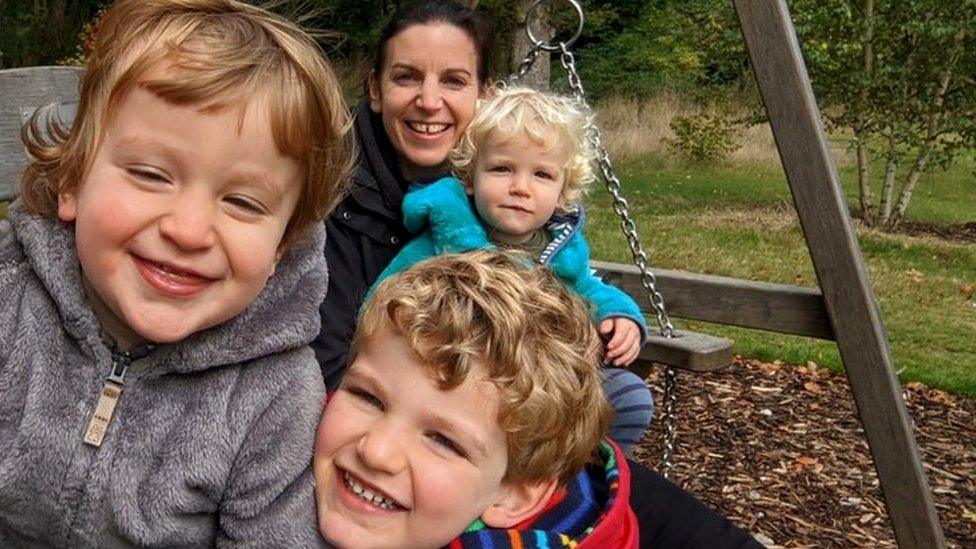Cash offer for new childcare workers amid shortage
- Published
- comments

A £1,000 cash incentive and a campaign to raise the profile of childcare workers in England are part of government plans to recruit more staff.
Thousands of extra nursery workers and childminders are needed, as the expansion of funded hours begins.
More than 100,000 working parents of two-year olds have already registered for the April rollout, according to the Department for Education (DfE).
And early-years charities say the campaign is "too late" to help.
By September 2025, all eligible pre-school children of working parents, from the age of nine months, will be able to access 30 hours of childcare during term time.
The offer comes at a time when the number of childcare providers is falling, mainly because of childminders leaving the profession, although the number of childcare places remains relatively stable.
About 27,500 early-years professionals will be needed to meet the expected rise in demand for places, an 8% expansion of the current workforce, the think tank Nesta, external estimates.
Biggest challenge
The recruitment campaign will highlight the important work of early-years professionals and include a £1,000 tax-free cash incentive, trialled in 20 local authorities, for up to 3,000 new hires or staff returning to early years, after three months in the job.

Are you affected by the issues raised in this story? Get in touch.
WhatsApp: +44 7756 165803, external
Tweet: @BBC_HaveYourSay, external
Please read our terms & conditions and privacy policy

Early Years Alliance chief executive Neil Leitch hopes it will raise awareness of the fantastic job early educators do but adds: "Any suggestion that this campaign alone will be enough to drive up educator numbers in time to meet rising demand is ludicrous.
He also says it "does little to retain both new and existing staff in the long-term".
Recruiting and retaining staff is the biggest challenge facing all early-years providers, National Day Nurseries Association (NDNA) chief executive of Purnima Tanuku says.
And she says campaigns like this take time to have "a positive impact" - and the sector needs qualified and experienced staff now.
Children's Minister David Johnston has told BBC Radio 4's Today programme the government has a "very clear plan" which "will work" and that he is "confident" there will be enough places for two-year olds eligible for the scheme, however more staff will be needed for the full 30-hour expansion.

Former nursery practitioner Liz George had to take £3,000 out of her savings over six months just to get by
Low pay and limited career progression are among the main reasons staff leave.
After more than 30 years working in childcare, Liz George, from Swindon, made the "heartbreaking" decision to change career last February.
It all came to a head when she opened her payslip and cried because she was going to have to take money out of her savings account again "just to get us through the month".
Liz, who has two teenage children, now earns more working in a call centre than she did as a room leader with a qualification in early years.
"I always knew I wanted to work with children - but I couldn't afford to do it anymore" she says. "I had to put my family first."
Early-years workers are seen as "glorified babysitters" rather than teachers - and the pay does not reflect the job they do - so a one-off payment of £1,000 would definitely not entice her back.

Overall, however, the number of early-years workers increased by 4% between 2022 and 2023, from 334,400 to 347,300, and is now back at pre-pandemic levels.
This is mainly due to a rise in staff working in private providers and school-based nurseries - but the number of people working in voluntary group providers and childminders is continuing to fall.
For many nurseries, apprenticeships are key to filling the workforce gap.
Luci Rickard, 18, from Rugby, Warwickshire, joined Busy Bees shortly after completing her GCSEs and is now taking her level-three qualification.
Luci, who enjoys the mix of practical on-the-job and coursework, is one of 1,300 apprentices in the nursery group, the largest in the UK, and it is looking to recruit hundreds more this year.
Its Europe chief executive, Chris McCandless, says it welcomes the government recruitment campaign, as the industry needs to grow.

Luci Rickard attended Busy Bees as a toddler and is now one of its apprentices
Some parents of two-year-olds eligible for the funded hours in April are still struggling to secure a nursery place and fear being left behind, according to Pregnant Then Screwed founder Joeli Brearley.
In January, both the prime minister and the children's minister had to defend the childcare expansion plans, after concerns were also raised about some parents being unable to apply in time.
The government said the IT issues had been resolved and parents would receive their eligibility code on time.
But some nurseries and childminders say they still do not know how much local-authority funding they will receive for April's rollout and are struggling to plan ahead.
'High-quality childcare'
The DfE expects all nurseries and childminders to know by the end of February what rate they will receive.
It was now working to change the rules, so local authorities would have to confirm rates within eight weeks of the government setting out how much councils would receive for funded childcare-hours in the Autumn, it added.
Data analysis by Daniel Wainwright and Megan Riddell
Related topics
- Published23 July 2023

- Published9 March 2023
